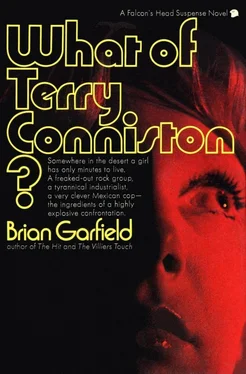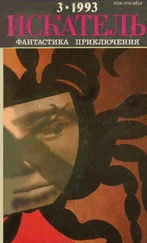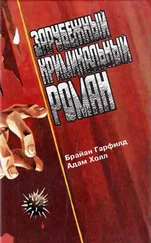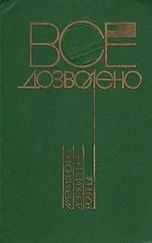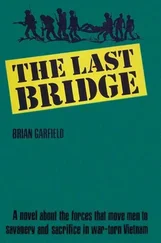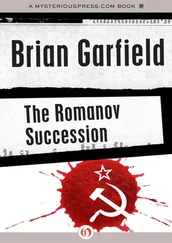Брайан Гарфилд - What of Terry Conniston?
Здесь есть возможность читать онлайн «Брайан Гарфилд - What of Terry Conniston?» весь текст электронной книги совершенно бесплатно (целиком полную версию без сокращений). В некоторых случаях можно слушать аудио, скачать через торрент в формате fb2 и присутствует краткое содержание. Город: New York, Год выпуска: 1971, Издательство: World Publishing, Жанр: Криминальный детектив, thriller_psychology, на английском языке. Описание произведения, (предисловие) а так же отзывы посетителей доступны на портале библиотеки ЛибКат.
- Название:What of Terry Conniston?
- Автор:
- Издательство:World Publishing
- Жанр:
- Год:1971
- Город:New York
- ISBN:нет данных
- Рейтинг книги:3 / 5. Голосов: 1
-
Избранное:Добавить в избранное
- Отзывы:
-
Ваша оценка:
- 60
- 1
- 2
- 3
- 4
- 5
What of Terry Conniston?: краткое содержание, описание и аннотация
Предлагаем к чтению аннотацию, описание, краткое содержание или предисловие (зависит от того, что написал сам автор книги «What of Terry Conniston?»). Если вы не нашли необходимую информацию о книге — напишите в комментариях, мы постараемся отыскать её.
A freaked-out rock group, a tyrannical industrialist, a very clever Mexican cop — the ingredients of a highly explosive confrontation.
What of Terry Conniston? — читать онлайн бесплатно полную книгу (весь текст) целиком
Ниже представлен текст книги, разбитый по страницам. Система сохранения места последней прочитанной страницы, позволяет с удобством читать онлайн бесплатно книгу «What of Terry Conniston?», без необходимости каждый раз заново искать на чём Вы остановились. Поставьте закладку, и сможете в любой момент перейти на страницу, на которой закончили чтение.
Интервал:
Закладка:
The wind caught the cover of a book on the passenger seat and flipped it open. She slapped it shut and turned it around on the seat with its spine to the wind. Modern Literary Criticism . The classroom would calm her down. It was a calm place, isolated, locked away from the rest of the world — a place where P.R . meant not public relations but Partisan Review . A room full of pot-smoking short-haired girls and long-haired boys with shaggy moustaches. It was a world that would never be hers, any more than her father’s would be; she despised his world of wealth and business but she would never fit into a literary ivory tower. By the cruel trick of birth she had been forced into a circumstance where the simple desire to be a woman — unsophisticated, without intellectual or financial pretense, just a woman to make a home and have babies — was denied her.
Seething, her mind on fire, not knowing what she wanted or how she felt, she drove at four thirty past a dusty side road that led to some forgotten destination across the hills; a dusty car was parked along the shoulder with two or three vague shapes inside but she didn’t notice it when she went by at sixty miles an hour. Four hours from now she would return by this route and pass the same side road.
Dressed casually for dinner, Oakley entered the splendid dark-oak dining room shortly after six o’clock in time to see Earle Conniston pour a glass of gin and anoint it with a few drops of vermouth. Conniston had got a grip on himself after Terry’s stormy departure and hadn’t said a word about it since. Oakley, his eyes narrowed with conjecture, was only faintly aware of Louise’s approach until she snapped her fingers in front of him and laughed gaily — too gaily, he thought — and, having gained his attention, presented him to the house guest, Frankie Adams, who wore Bermuda shorts and a loud short-sleeved Hawaiian sports shirt, garments which revealed undue lengths of unattractive bony legs and flaccid hairy arms. Adams had a small round head dominated by the biggest nose Oakley had ever seen.
Shaking the little man’s hand was like gripping a fresh-caught trout. Making conversation, Oakley said, “That’s a pretty wild shirt.”
“Yeah. It got arrested twice.” Frankie Adams grinned, showing capped teeth. His hair was slicked back, thick and Indian-black; his narrow face was meticulously shaved to minimize a Mediterranean beard-stubble and he smelled of expensive after-shave. He had the knowing eye of an accomplished procurer, the raspy voice of a pitchman; whatever his past, it had burdened him with a stealthy appearance; yet for all that, Oakley did not find him disagreeable. (He recalled a remark of Conniston’s an hour ago, sour reference to Adams: “Been here six days now. No telling when we’ll get rid of him. Some people can stay longer in a week than others can in a year.”)
Oakley said desultorily, “You and Louise knew each other in New York.”
“Worked some of the same teevee shows,” Adams said, and struck an Ed Sullivan pose. “And on our shew t’night, lez an’ gennulmen, the wunnenonly LLLOOOOZE HARRIS, straight from her starrn role on Browway with Misser HENNRY FONNA— Now lessere it for Franchie Athams, lez an’ gennulmen, Franchie Athams!”
Adams bowed to the audience and coughed behind his wrist.
Conniston came from the side bar with a small round wooden tray holding four drinks. It did not escape Oakley that the liquid in the drinks trembled. Louise was still laughing merrily at Adams’ imitation of Sullivan; Oakley had to admit it had been uncanny, even considering Sullivan’s imitability. The tone and quality of the voice had been exact, the phrasing perfect. Adams wheeled toward Louise and launched into Henry Fonda doing a Wyatt Earp speech from My Darling Clementine , which convulsed her; Conniston looked on, unamused. Louise’s tawny hair gathered light; unconsciously she struck theatrical poses in Adams’ company. (“Seems the sonofabitch out of work,” Conniston had explained. “Camping out with old buddies until his agent can get him bookings. Says he’s broke because he played slow horses. Told me his father was always ahead of his time, went bankrupt in 1928, which was supposed to break me up in helpless laughter. Can’t stand the debauched little bastard.” Understandable, now that Oakley had met Adams: the comedian had a flip manner of a sort offensive to the sanctimonious — and Conniston, in his profane way, was the most pious of men.)
Conniston stood a slight distance apart, drinking quickly, watching Adams distastefully. Suddenly Adams turned toward Oakley, breaking off his drawl, and winked brashly. “Tell you what, Carl, send message Cairo cancel Russian oil leases or we pull out. Hell with widows and orphans. What’s one lousy billion? Teach sonabitch Arabs thing or two. Make him realize Conniston important man.”
Adams was halfway through the speech before any of them caught on to the fact that he was doing Conniston — and doing him with eerie accuracy, down to the shoulderlifting gesture and the fast blink of eyes. The speech completed, Adams settled back to await applause. It was forthcoming only from Louise. Embarrassed, Oakley did not stir. Conniston drew himself up. Adams beamed at him, dapper and pouter-pigeon-proud. “You ready for that, hey?”
“I don’t find that amusing,” Conniston remarked. He turned his back to Adams and strode across the room to the bar.
Adams’ face fell; Louise said, “Really, darling” — calling her husband “darling” with steely emphasis.
Conniston mixed a fresh martini for himself before he replied; then, turning to face them, he said caustically, “Don’t tell me you’re afraid I’ve put guest’s nose out of joint.”
Trying to cut the tension, Adams said weakly, “Let’s have no loose remarks about my nose.” He tried to smile. With a nervous gesture toward his feet he said, “I sure admire your house, Earle. Never saw a carpet like this — you need snowshoes to travel it. Oh hell, never mind me, I thought it was funny, hey? Didn’t mean to insult you. Chalk it up I’ve spent too many years in fourth-rate clubs MC’ing blue acts. MC, that’s Mental Case, hey? Look, I’m sorry, okay?”
Oakley watched the jewel-hard shine of Louise’s glance against Conniston. Conniston shook his head and threw back his head to drain the martini at one gulp; afterward he said, “All right — all right. Didn’t mean to fly off handle. Been a lousy day — apologize.”
“Sure... sure,” Adams said, and stood silent, having run out of things to say.
“Really!” Louise breathed, and strode toward the kitchen, walking with a magnificent jounce and heave of young buttocks which seemed to writhe with a life of their own. Oakley caught the way Adams stared at her, unblinking. He distinctly heard Adams whisper, “Yes sirree Bob,” although it was plain Conniston didn’t catch it. When Oakley threw a direct glance at Adams the comedian met it with a guileless lecherous wink. Oakley turned half away and closed his eyes. So that was how it was: Louise’s childish revenge. She would use Adams to pay Conniston back for his “neglect.” That was why she had uttered her extraordinary plea earlier: “He just shuts me out. What can I do?” She had been absolving herself of the blame for it. Trying to convince Oakley that whatever happened was Earle’s fault, not hers. She was an actress; she needed an audience to applaud her performance; she wanted Oakley’s good opinion.
She must hate Earle terribly to do it right here in his own house under his nose. Watching Conniston’s broad tense back as Conniston poured himself a third drink, Oakley thought, I don’t know if I can blame her .
A few hours later the phone rang.
Читать дальшеИнтервал:
Закладка:
Похожие книги на «What of Terry Conniston?»
Представляем Вашему вниманию похожие книги на «What of Terry Conniston?» списком для выбора. Мы отобрали схожую по названию и смыслу литературу в надежде предоставить читателям больше вариантов отыскать новые, интересные, ещё непрочитанные произведения.
Обсуждение, отзывы о книге «What of Terry Conniston?» и просто собственные мнения читателей. Оставьте ваши комментарии, напишите, что Вы думаете о произведении, его смысле или главных героях. Укажите что конкретно понравилось, а что нет, и почему Вы так считаете.
